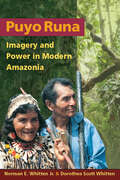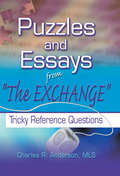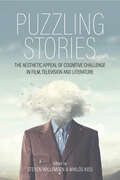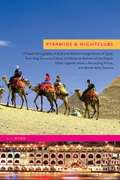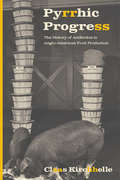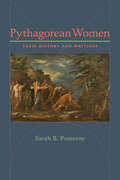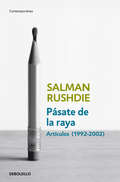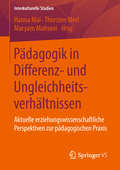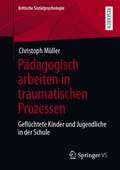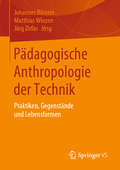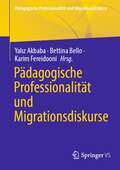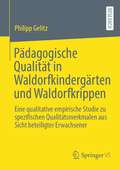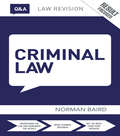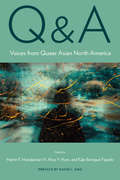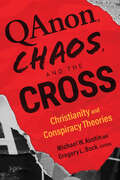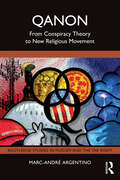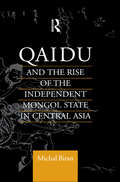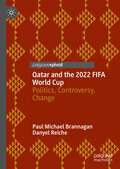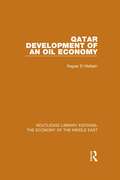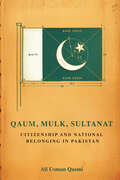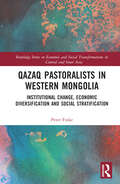- Table View
- List View
Puvi Iyal (Geography) 12th Standard - Tamilnadu Board
by Training State Council of Educational ResearchPuvi Iyal (Geography) Textbook for the 12th Standard Students, preparing for Tamil Nadu State Board Exam.
Puyo Runa: Imagery and Power in Modern Amazonia
by Norman E. Whitten Dorothea Scott WhittenThe Andean nation of Ecuador derives much of its revenue from petroleum that is extracted from its vast Upper Amazonian rain forest, which is home to ten indigenous nationalities. Norman E. Whitten Jr. and Dorothea Scott Whitten have lived among and studied one such people, the Canelos Quichua, for nearly forty years. In Puyo Runa, they present a trenchant ethnography of history, ecology, imagery, and cosmology to focus on shamans, ceramic artists, myth, ritual, and political engagements. Canelos Quichua are active participants in national politics, including large-scale movements for social justice for Andean and Amazonian people. Puyo Runa offers readers exceptional insight into this cultural world, revealing its intricacies and embedded humanisms.
Puzzles and Essays from 'The Exchange': Tricky Reference Questions
by Charles R AndersonWho said that? When did that happen? Where the heck does that thing come from? Was that French, or what? What's that supposed to mean?For 35 years, librarians in the United States and other countries sent puzzles they could not solve locally to “The Exchange,” a column for reference librarians appearing in RQ (and later, RUSQ), the official journal of the Reference and User Services Division of the ALA. Other readers often furnished the answers--sometimes years or even decades later! Puzzles and Essays from "The Exchange" organizes those perplexing questions and answers into a reader-friendly reference format, embellished with essays that appeared in the column over the last fifteen years of its publication.This unique collection of questions and answers that stumped librarians on four continents over a 35-year period comes complete with authoritative bibliographic citations. It also contains an extensive subject, person, and keyword index, providing easy access to the material.Packed with fascinating information, little-known trivia, and hard-to-find facts, Puzzles and Essays from "The Exchange" is a wonderful reference source, answering difficult questions about: the origins of common--and not-so-common-customs, like giving engagement rings, driving on the right or left side of the road, tying yellow ribbons around trees in memory of captives, leg shaving, visits from the “Tooth Fairy,” and much, much more! the origins of words, phrases, and terms that don&’t, when taken literally, make much sense the origins of popular sayings--The grass is always greener; The whole nine yards; It ain't over until the fat lady sings; Close but no cigar; Going down the tube; Light at the end of the tunnel; Katy, bar the door; Goodbye, cruel world; etc. the sources of famous quotations--both spurious and real! the sources of poetry fragments and bits of verse that have become part of the popular lexicon hard-to-find biographical information-from George Washington Carver's many uses for the peanut and the sweet potato to the name of Paul Revere's horse to the truth about the “let them eat cake” story attributed to Marie Antoinette trivia and miscellany--how lullabies began; why a yawn is contagious when a sneeze is not; what the names of the monkeys in The Wizard of Oz were; why pigeons bob their heads when they walk; what the vital statistics of the Venus de Milo are; and much more! the history of “The Exchange” itself!Puzzles and Essays from "The Exchange" will also challenge you with a list of so-far unanswered questions, unidentified quotations, and popular sayings whose origins are still generally unknown. Perhaps you&’ll be the one to answer the riddles that stumped the editors and readers of “The Exchange!”</ul
Puzzling Stories: The Aesthetic Appeal of Cognitive Challenge in Film, Television and Literature
by Miklós Kiss Steven WillemsenMany films and novels defy our ability to make sense of the plot. While puzzling storytelling, strange incongruities, inviting enigmas and persistent ambiguities have been central to the effects of many literary and cinematic traditions, a great deal of contemporary films and television series bring such qualities to the mainstream—but wherein lies the attractiveness of perplexing works of fiction? This collected volume offers the first comprehensive, multidisciplinary, and trans-medial approach to the question of cognitive challenge in narrative art, bringing together psychological, philosophical, formal-historical, and empirical perspectives from leading scholars across these fields.
Puzzling Stories: The Aesthetic Appeal of Cognitive Challenge in Film, Television and Literature
by Miklós Kiss Steven WillemsenMany films and novels defy our ability to make sense of the plot. While puzzling storytelling, strange incongruities, inviting enigmas and persistent ambiguities have been central to the effects of many literary and cinematic traditions, a great deal of contemporary films and television series bring such qualities to the mainstream—but wherein lies the attractiveness of perplexing works of fiction? This collected volume offers the first comprehensive, multidisciplinary, and trans-medial approach to the question of cognitive challenge in narrative art, bringing together psychological, philosophical, formal-historical, and empirical perspectives from leading scholars across these fields.
Pyramids & Nightclubs
by L. L. WynnLiving in Egypt at the turn of the millennium, cultural anthropologist L. L. Wynn was struck by the juxtapositions of Western, Gulf Arab, and Egyptian viewpoints she encountered. For some, Egypt is the land of mummies and pharaohs. For others, it is a vortex of decadence, where nightlife promises a chance to salivate over belly dancers and maybe even glimpse a movie star. Offering a new approach to ethnography, Pyramids and Nightclubs examines cross-cultural encounters to bring to light the counterintuitive ways in which Egypt is defined. Guiding readers on an armchair journey that introduces us to Russian and Australian belly dancers on Nile cruise ships, Egyptian rumors about an Arab prince and his royal entourage, Saudi girls looking for a less restrictive dating scene, and other visitors to this "antique" land, Wynn uses the lens of travel and tourism to depict a fascinating and often surprising version of Egypt, while exploring the concept of stereotype itself. Tracing the history of Western and Arab fascination with Egypt through spurious hunts for lost civilizations and the new economic disparities brought about by the oil industry, Pyramids and Nightclubs ultimately describes the ways in which moments of cultural contact, driven by tourism and labor migration, become eye-opening opportunities for defining self and other.
Pyramids and Nightclubs: A Travel Ethnography of Arab and Western Imaginations of Egypt, from King Tut and a Colony of Atlantis to Rumors of Sex Orgies, Urban Legends about a Marauding Prince, and Blonde Belly Dancers
by L. L. WynnLiving in Egypt at the turn of the millennium, cultural anthropologist L. L. Wynn was struck by the juxtapositions of Western, Gulf Arab, and Egyptian viewpoints she encountered. For some, Egypt is the land of mummies and pharaohs. For others, it is a vortex of decadence, where nightlife promises a chance to salivate over belly dancers and maybe even glimpse a movie star. Offering a new approach to ethnography, Pyramids and Nightclubs examines cross-cultural encounters to bring to light the counterintuitive ways in which Egypt is defined. Guiding readers on an armchair journey that introduces us to Russian and Australian belly dancers on Nile cruise ships, Egyptian rumors about an Arab prince and his royal entourage, Saudi girls looking for a less restrictive dating scene, and other visitors to this "antique" land, Wynn uses the lens of travel and tourism to depict a fascinating and often surprising version of Egypt, while exploring the concept of stereotype itself. Tracing the history of Western and Arab fascination with Egypt through spurious hunts for lost civilizations and the new economic disparities brought about by the oil industry, Pyramids and Nightclubs ultimately describes the ways in which moments of cultural contact, driven by tourism and labor migration, become eye-opening opportunities for defining self and other.
Pyrrhic Progress: The History of Antibiotics in Anglo-American Food Production (Critical Issues in Health and Medicine)
by Claas KirchhellePyrrhic Progress analyses over half a century of antibiotic use, regulation, and resistance in US and British food production. Mass-introduced after 1945, antibiotics helped revolutionize post-war agriculture. Food producers used antibiotics to prevent and treat disease, protect plants, preserve food, and promote animals’ growth. Many soon became dependent on routine antibiotic use to sustain and increase production. The resulting growth of antibiotic infrastructures came at a price. Critics blamed antibiotics for leaving dangerous residues in food, enabling bad animal welfare, and selecting for antimicrobial resistance (AMR) in bacteria, which could no longer be treated with antibiotics. Pyrrhic Progress reconstructs the complicated negotiations that accompanied this process of risk prioritization between consumers, farmers, and regulators on both sides of the Atlantic. Unsurprisingly, solutions differed: while Europeans implemented precautionary antibiotic restrictions to curb AMR, consumer concerns and cost-benefit assessments made US regulators focus on curbing drug residues in food. The result was a growing divergence of antibiotic stewardship and a rise of AMR. Kirchhelle’s comprehensive analysis of evolving non-human antibiotic use and the historical complexities of antibiotic stewardship provides important insights for current debates on the global burden of AMR.
Pythagorean Women: Their History and Writings
by Sarah B. PomeroyLove triangles and Pythagorean women.In Pythagorean Women, classical scholar Sarah B. Pomeroy discusses the groundbreaking principles that Pythagoras established for family life in Archaic Greece, such as constituting a single standard of sexual conduct for women and men. Among the Pythagoreans, women played an important role and participated actively in the philosophical life. While Pythagoras encouraged women to be submissive to men, his reasoning was based on the desire to preserve harmony in the home. Pythagorean Women provides English translations of all the earliest extant examples of literary Greek prose by Neopythagorean women, shedding light on their attitudes about marriage, the home, music, and the cosmos. Pomeroy sets the Pythagorean and Neopythagorean women vividly in their historical, ecological, and intellectual contexts, illustrated with original photographs of sites and artifacts known to these women.
Pásate de la raya: Artículos, 1992-2002
by Salman RushdieUna colección de los artículos de prensa de Salman Rushdie escritos entre 1992 y 2002 que recoge sus opiniones. Los artículos que componen este volumen nos descubren el lado más personal y más cercano de uno de nuestros autores contemporáneos más importantes. De una manera franca y directa, Salman Rushdie nos habla de su afición al fútbol, su predilección por la música de U2 o su entusiasmo por El mago de Oz; asimismo, nos da su opinión sobre política o sobre su propia fetua, y también evalúa la obra de varios escritores. Pero lo más valioso de esta recopilación es que nos proporciona la visión íntima de un escritor e intelectual que analiza y juzga nuestra sociedad actual con una profundidad y una precisión expresiva que pocos alcanzan. Un libro que ofrece placeres inesperados a todos los que disfrutan del poder de la palabra. Opinión:«Pásate de la raya es un reconstituyente para la moral... Un libro acerca de la libertad, sus glorias y su alto precio.»The Globe and Mail
Pädagogik in Differenz- und Ungleichheitsverhältnissen: Aktuelle erziehungswissenschaftliche Perspektiven zur pädagogischen Praxis (Interkulturelle Studien)
by Hanna Mai Thorsten Merl Maryam MohseniDie Beiträge des Bandes befassen sich mit der Frage, wie in pädagogischen Praktiken soziale Differenzen und damit verknüpfte Ungleichheitsverhältnisse (re)produziert werden. Mit dem Anspruch einer machtkritischen, reflexiven Forschung wird strukturelle Diskriminierung im Hinblick auf u. a. Rassismus, Klassismus, Sexismus beleuchtet. Um dominanten Repräsentationsverhältnissen entgegenzuwirken, dienten sowohl die Etabliertheit in der Wissenschaft als auch die soziale Positionierung der Autoren und Autorinnen als Auswahlkriterien für das Buch. Wie der Umgang mit Differenz und Diskriminierung in erziehungswissenschaftlicher Hinsicht verstanden werden kann und welche Forschungsaktivitäten und -perspektiven hierzu gegenwärtig bearbeitet werden, wird in dem Sammelband dargestellt.Der Inhalt● Zur Positionierung von Wissenschaftler*innen● Herstellung von Differenz und Diskriminierung in schulischen Zuordnungspraktiken zur Kategorie nichtdeutsche Herkunftssprache● Differenzkonstruktionen in der Grundschule● Subjektivierung und Rassifizierung in Bildungskontexten● Interdependente Klassismusanalyse als kollektive Forschung● Privilegienreflexion im Kontext der pädagogischen Arbeit● Heteronormativitätskritische Perspektiven auf diskriminierungssensible Bildungsarbeit ● Zu den Bedingungen des Gelingens von Empowerment-Workshops● Positionierungen miteinander vergleichen ● Zur irritierenden Präsenz und positionierten Professionalität von Pädagog*innen of ColorDie ZielgruppenForschende, Lehrende und Studierende der Erziehungs-/Bildungswissenschaft sowie Professionelle pädagogische Praktiker und PraktikerinnenDie HerausgeberHanna Mai, Thorsten Merl, Maryam Mohseni
Pädagogisch arbeiten in traumatischen Prozessen: Geflüchtete Kinder und Jugendliche in der Schule (Kritische Sozialpsychologie)
by Christoph MüllerDas Buch ist eine kritische und systematische Auseinandersetzung mit den schulpädagogisch sowie gesellschaftspolitisch hochaktuellen Themen Flucht und Trauma.Geflüchtete Kinder und Jugendliche befinden sich häufig in einem sequenziell traumatischen Prozess, zu dem neben den fluchtauslösenden Bedingungen und der Flucht selbst auch die Lebensbedingungen im Aufnahmeland gehören.Im Zentrum dieser Studie stehen die Fragen, wie sich die emotionalen Belastungen und potenziellen Traumatisierungen geflüchteter Schüler*innen in der Schule zeigen, wie sie sich im Erleben und Handeln der Lehrkräfte widerspiegeln und welche pädagogischen Konsequenzen sich daraus ergeben.Um dem nachzugehen, was es für die Lehrkräfte bedeutet, inmitten der traumatischen Prozesse der geflüchteten Schüler*innen pädagogisch zu arbeiten, wurden u.a. themenzentrierte Tiefeninterviews mit Lehrkräften geführt und tiefenhermeneutisch ausgewertet.Aufbauend auf den Ergebnissen der Studie werden Konsequenzen für die pädagogische Praxis, die Professionalisierung von Lehrkräften und hinsichtlich eines strukturellen Handlungsbedarfs gezogen.
Pädagogische Anthropologie der Technik: Praktiken, Gegenstände und Lebensformen
by Johannes Bilstein Jörg Zirfas Matthias WinzenDer Band geht der Frage nach, welche spezifisch edukativen Techniken angesichts der zunehmenden Etablierung und Professionalisierung der pädagogischen Arbeitsfelder erforderlich werden. In diesem Zusammenhang wird zu klären versucht, welche pädagogische und didaktische Vorbereitung auf eine zunehmend technisch orientierte Welt erfolgen muss. Zudem werden die alltäglichen Techniken der Selbstsorge analysiert. Und schließlich geht es in einer Pädagogischen Anthropologie auch um die Frage, wer Subjekt und Objekt der Technik ist.
Pädagogische Professionalität und Migrationsdiskurse (Pädagogische Professionalität und Migrationsdiskurse)
by Karim Fereidooni Yalız Akbaba Bettina BelloDer Band stellt Forschungsarbeiten vor, in denen aus differenz-, macht- und rassismuskritischen Perspektiven die Relationen zwischen pädagogischer Professionalität und Migrationsdiskursen untersucht werden. Ziel ist es, aktuelle Studien zum Thema erstmals zusammen darzustellen, sie im Gesamtblick hinsichtlich ihrer Methoden und Ergebnisse zu reflektieren, praxisrelevante Reflexionen zu bieten, sowie Anschlussfragen für die Wissenschaft zu formulieren.
Pädagogische Qualität in Waldorfkindergärten und Waldorfkrippen: Eine qualitative empirische Studie zu spezifischen Qualitätsmerkmalen aus Sicht beteiligter Erwachsener
by Philipp GelitzWaldorfkindergärten und Waldorfkrippen stellen trotz ihres jahrzehntelangen Bestehens noch immer eine Forschungslücke dar. Neben vielen Publikationen zu Intentionen und Annahmen der vorschulischen Waldorfpädagogik gibt es weltweit fast gar keine empirischen Untersuchungen vorzuweisen. Diese Lücke soll die vorliegende Forschungsarbeit anfänglich schließen. Den Bezugsrahmen der Untersuchung bilden einerseits die erziehungswissenschaftlichen Diskurslinien um pädagogische Qualität in frühpädagogischen Einrichtungen und andererseits die theoretischen Grundpfeiler der Waldorfpädagogik. Vor diesem Hintergrund wird ein qualitatives Forschungsdesign entwickelt, das die beteiligten Erwachsenen im Feld – Fachkräfte, Dozierende und Eltern – nach besonderen Schwerpunkten der pädagogischen Qualität in Waldorfeinrichtungen befragt. Dabei kann gezeigt werden, dass es Merkmale gibt, wie z.B. bestimmte Annahmen über den Menschen, von der Bedeutung des freien Spiels, von Rhythmus, von sinnlichem Erleben und viele weitere, die für Waldorfkrippen und Waldorfkindergärten spezifisch zu sein scheinen. Die Arbeit hebt durch die Befragung einen Schatz an bisher verborgenem Handlungswissen, was sie zu einem Ausgangspunkt für viele weitere Forschungen und Hypothesenprüfungen macht.
Q&A Criminal Law: Q And A Criminal Law 2011-2012 (Questions and Answers)
by Norman BairdRoutledge Q&As give you the tools to practice and refine your exam technique, showing you how to apply your knowledge to maximum effect in an exam situation. Each book contains up to fifty essay and problem-based questions on the most commonly examined topics, complete with expert guidance and fully worked model answers. These books provide you with the skills you need for your exams by: Helping you to be prepared: each title in the series has an introduction presenting carefully tailored advice on how to approach assessment for your subject Showing you what examiners are looking for: each question is annotated with both a short overview on how to approach your answer, as well as footnoted commentary that demonstrate how model answers meet marking criteria Offering pointers on how to gain marks, as well as what common errors could lose them: ‘Aim Higher’ and ‘Common Pitfalls’ offer crucial guidance throughout Helping you to understand and remember the law: diagrams for each answer work to illuminate difficult legal principles and provide overviews of how model answers are structured Books in the series are also supported by a Companion Website that offers online essay-writing tutorials, podcasts, bonus Q&As and multiple-choice questions to help you focus your revision more effectively. Criminal Law Q&A covers the general principles of criminal law, homicide, non-fatal offences against the person and sexual offences, general defences, modes of participation, inchoate offences and vicarious liability, and offences against property.
Q&A: Voices from Queer Asian North America (Asian American History & Cultu)
by Martin F. Manalansan IV, Alice Y. Hom, and Kale Bantigue FajardoFirst published in 1998, Q & A: Queer in Asian America, edited by David L. Eng and Alice Y. Hom, became a canonical work in Asian American studies and queer studies. This new edition of Q & A is neither a sequel nor an update, but an entirely new work borne out of the progressive political and cultural advances of the queer experiences of Asian North American communities. The artists, activists, community organizers, creative writers, poets, scholars, and visual artists that contribute to this exciting new volume make visible the complicated intertwining of sexuality with race, class, gender, and ethnicity. Sections address activism, radicalism, and social justice; transformations in the meaning of Asian-ness and queerness in various mass media issues of queerness in relation to settler colonialism and diaspora; and issues of bodies, health, disability, gender transitions, death, healing, and resilience. The visual art, autobiographical writings, poetry, scholarly essays, meditations, and analyses of histories and popular culture in the new Q & Agesture to enduring everyday racial-gender-sexual experiences of mis-recognition, micro-aggressions, loss, and trauma when racialized Asian bodies are questioned, pathologized, marginalized, or violated. This anthology seeks to expand the idea of Asian and American in LGBTQ studies. Contributors: Marsha Aizumi, Kimberly Alidio, Paul Michael (Mike) Leonardo Atienza, Long T. Bui, John Paul (JP) Catungal, Ching-In Chen, Jih-Fei Cheng, Kim Compoc, Sony Coráñez Bolton, D’Lo, Patti Duncan, Chris A. Eng, May Farrales, Joyce Gabiola, C. Winter Han, Douglas S. Ishii, traci kato-kiriyama, Jennifer Lynn Kelly, Mimi Khúc, Anthony Yooshin Kim, Việt Lê, Danni Lin, Glenn D. Magpantay, Leslie Mah, Casey Mecija, Maiana Minahal, Sung Won Park, Thea Quiray Tagle, Emily Raymundo, Vanita Reddy, Eric Estuar Reyes, Margaret Rhee, Thomas Xavier Sarmiento, Pahole Sookkasikon, Amy Sueyoshi, Karen Tongson, Kim Tran, Kay Ulanday Barrett, Reid Uratani, Eric C. Wat, Sasha Wijeyeratne, Syd Yang, Xine Yao, and the editors
QAnon, Chaos, and the Cross: Christianity and Conspiracy Theories
by Edited by Michael W. Austin and Gregory L. Bock&“What is truth?&” said jesting Pilate, and would not stay for an answer. —Francis Bacon Although Christians are followers of the Truth, many find themselves tempted by the alternate &“truths&” offered by conspiracy theories. Christianity and conspiracy theories have had a long, complicated relationship. But today conspiracy theories are bringing our already polarized society to the brink of chaos. QAnon, the Big Lie, and anti-vaccination theories thrive online, disrupting faith communities. This timely essay collection explores the allure of conspiracy theories and their consequences—and ultimately offers gospel-based paths forward. Accessible to all concerned believers, QAnon, Chaos, and the Cross features scholars of religion, ethics, and public life on the following topics: • evaluating evidence and forming beliefs • the Satanic Panic of the 1960s–1990s • understanding scientific methodology • conspiracy theories&’ appeal to those searching for meaning • the consequences of social media and echo chambers • productive dialog with people who hold different opinions • intellectualism in the life of faith • conspiracy theories in Scripture • QAnon&’s religious rhetoric Complete with a guide to reasoning, which outlines both logical fallacies and intellectual virtues, QAnon, Chaos, and the Cross is an indispensable resource for all Christians seeking the truth. Contributors:Chase Andre, Michael W. Austin, Bradley Baurain, Daniel Bennett, Gregory L. Bock, Chad Bogosian, Kevin Carnahan, Jason Cook, Scott Culpepper, Stephen Davis, Garrett J. Deweese, Marlena Graves, Shawn Graves, David Horner, Dru Johnson, Nathan King, Rick Langer, Christian Miller, Timothy Muehlhoff, Michelle Lynn Panchuk, Susan Peppers-Bates, Steven Porter, Kaitlyn Schiess, Aaron Simmons, Domonique Turnipseed, Rachel I. Wightman, Keith Wyma, Eric Yang
QAnon: From Conspiracy Theory to New Religious Movement (Routledge Studies in Fascism and the Far Right)
by Marc-André ArgentinoThis book explores the QAnon movement by examining its history, fluctuations, and evolution, stemming from the likelihood of multiple users behind the “Q” account, as well as from the changes in the sociopolitical landscape since the creation of the movement. It frames QAnon as a lived religion and demonstrates that it has gone through three stages of existence: proto-QAnon, canonical-QAnon, and apocryphal-QAnon.Author Marc-André Argentino argues that QAnon evolved into something more than a conspiracy theory and demonstrates through a comparative analysis that QAnon is more akin to a new religious movement, in particular a hyper-real religion. He explores the role of gender and women in the QAnon movement, followed by an examination of how the QAnon conspiracy theories have legitimized and coordinated targeted gender-based violence. The book provides evidence of the nexus of QAnon and ideologically-motivated violent extremism and criminality. Finally, it examines the evolution of QAnon after the January 6th insurrection, the loss of the 2020 election by Donald Trump, and the disappearance of “Q.” This volume will be of great interest to researchers of conspiracy theories, new religious movements, American politics, and extremism.
QCA with R: A Comprehensive Resource
by Adrian DuşaThis book is a comprehensive guide to qualitative comparative analysis (QCA) using R. Using Boolean algebra to implement principles of comparison used by scholars engaged in the qualitative study of macro social phenomena, QCA acts as a bridge between the quantitative and the qualitative traditions. The QCA package for R, created by the author, facilitates QCA within a graphical user interface. This book provides the most current information on the latest version of the QCA package, which combines written commands with a cross-platform interface. Beginning with a brief introduction to the concept of QCA, this book moves from theory to calibration, from analysis to factorization, and hits on all the key areas of QCA in between. Chapters one through three are introductory, familiarizing the reader with R, the QCA package, and elementary set theory. The next few chapters introduce important applications of the package beginning with calibration, analysis of necessity, analysis of sufficiency, parameters of fit, negation and factorization, and the construction of Venn diagrams. The book concludes with extensions to the classical package, including temporal applications and panel data. Providing a practical introduction to an increasingly important research tool for the social sciences, this book will be indispensable for students, scholars, and practitioners interested in conducting qualitative research in political science, sociology, business and management, and evaluation studies. <P><P><i>Advisory: Bookshare has learned that this book offers only partial accessibility. We have kept it in the collection because it is useful for some of our members. Benetech is actively working on projects to improve accessibility issues such as these.</i>
Qaidu and the Rise of the Independent Mongol State In Central Asia (Central Asia Research Forum)
by Michal BiranQaidu (1236-1301), one of the great rebels in the history of the Mongol Empire, was the grandson of Ogedei, the son Genghis Khan had chosen to be his heir. This boof recounts the dynastic convolutions and power struggle leading up to his rebellion and subsequent events.
Qatar and the 2022 FIFA World Cup: Politics, Controversy, Change
by Danyel Reiche Paul Michael BrannaganThis book offers the first, full academic analysis of the Qatar 2022 FIFA World Cup. Adopting an international relations perspective, the authors critically interrogate the politics and controversy that has surrounded arguably the most controversial sports event ever. In doing so, this text offers up an imperative examination of Qatar’s desired objectives through their investment in global sport and sports events, as well as provides readers with an academic explanation on why major event hosts – such as Qatar – receive so much international scrutiny in the pre-event stage of the event hosting process. On the back of this international scrutiny, this text also provides the first full analysis on how such negative scrutiny has forced Qatar to implement various social-political changes at home.
Qatar: Development of an Oil Economy (Routledge Library Editions: The Economy of the Middle East)
by Ragaei el MallakhNo region in the world has seen so much development activity in the last ten years as the Gulf area. Since ‘black gold’ catapulted the oil-producing countries into the limelight of the international political and economic scene, there has been a proliferation of studies on the larger exporting states. However, many of the so-called ‘small countries’ have been neglected in this exercise. This book presents the first detailed examination of the bases and extent of economic development in Qatar and considers the need to translate the petroleum-generated growth into viable, self-sustained development. Qatar, though not one of the oil ‘giants’, was first in the field of oil development and exhibits a number of special features not shared by its Gulf neighbours: for example in pre-oil boom days it was already in advance of many other Gulf states in the field of education; it has a modest agriculture sector and there is a comparatively strong attachment to the land; and finally it has played an important role in OPEC as a member of the ‘moderate price’ camp. The individual chapters trace the development of the oil industry, outline public financing and economic policy and sketch the issues involved in industrialisation, absorptive capacity and agricultural development. Examination is made of the social and physical infrastructure as well as money and banking, and the international linkages in trade, foreign aid, economic cooperation efforts and investment opportunities are elucidated. Planners in Qatar know that their revenue base in petroleum is finite, and thus investment of present surplus needs careful planning. The book therefore also outlines current government priorities and suggests areas for future investments. First published in 1979.
Qaum, Mulk, Sultanat: Citizenship and National Belonging in Pakistan (South Asia in Motion)
by Ali Usman QasmiAfter the trauma of mass violence and massive population movements around the partition of India and Pakistan in 1947, both new nation states faced the enormous challenge of creating new national narratives, symbols, and histories, as well as a new framework for their political life. While leadership in India claimed the anti-colonial movement, Gandhi, and a civilizational legacy in the subcontinent, the new political elite in Pakistan were faced with a more complex task: to carve out a separate and distinct Muslim history and political tradition from a millennium long history of cultural and religious interaction, mixing, and coexistence. Drawing on a rich archive of diverse sources, Ali Qasmi traces the complex development of ideas of citizenship and national belonging in the postcolonial Muslim state, offering a nuanced and sweeping history of the country's formative period. Qasmi paints a rich picture of the long, arduous, and often conflict-ridden process of writing a democratic constitution of Pakistan, while simultaneously narrating the invention of a range of new rituals of state—such as the exact color of the flag, the precise date of birth of the national poet of Pakistan, and the observation of Eid as a "national festival"—providing an illuminating analysis of the practices of being Pakistani, and a new portrait of Muslim history in the subcontinent.
Qazaq Pastoralists in Western Mongolia: Institutional Change, Economic Diversification and Social Stratification (Routledge Series on Economic and Social Transformations in Central and Inner Asia)
by Peter FinkeTaking the case of Qazaq Pastoralists in Western Mongolia, this book looks at the universal human requirement to balance individual flexibility and strategies designed to make a living with the social expectations that impose particular rules of conduct but also enable mutual trust and cooperation to emerge. Pastoralists in Western Mongolia have experienced dramatic changes in recent decades, including the dismantling of the socialist economy, a series of natural disasters, and an emigration of roughly half of the local Qazaq minority to the newly independent state of Qazaqstan. Four aspects illustrate the chances and challenges that people face. First is the emergence of the market as the dominant mode of production and exchange, a thorny way full of uncertainties. Second is the individual household and its adaptation to the new economic system, creating new opportunities as well as precarities, and resulting in rapid social stratification. Thirdly, patterns of pastoral land allocation highlight problems of collective action and institutional fragmentation in the wake of a retreating state apparatus. Finally, social networks of mutual support and cooperation constitute a key component of pastoral livelihood but are under great pressure due to short time horizons and a lack of trust. The first longitudinal analysis of the Qazaqs in Mongolia in English and a contribution to anthropological theories on human adaptability and decision-making, economic and social inequalities, institutional change and the difficulty of deriving at cooperative solutions, this book will be a standard work and of interest to academics in the field of Central Asian Studies, Anthropology, Human Geography and Development Studies.

